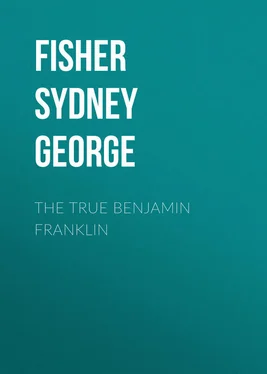Sydney Fisher - The True Benjamin Franklin
Здесь есть возможность читать онлайн «Sydney Fisher - The True Benjamin Franklin» — ознакомительный отрывок электронной книги совершенно бесплатно, а после прочтения отрывка купить полную версию. В некоторых случаях можно слушать аудио, скачать через торрент в формате fb2 и присутствует краткое содержание. Жанр: История, foreign_antique, foreign_prose, Биографии и Мемуары, на английском языке. Описание произведения, (предисловие) а так же отзывы посетителей доступны на портале библиотеки ЛибКат.
- Название:The True Benjamin Franklin
- Автор:
- Жанр:
- Год:неизвестен
- ISBN:нет данных
- Рейтинг книги:4 / 5. Голосов: 1
-
Избранное:Добавить в избранное
- Отзывы:
-
Ваша оценка:
- 80
- 1
- 2
- 3
- 4
- 5
The True Benjamin Franklin: краткое содержание, описание и аннотация
Предлагаем к чтению аннотацию, описание, краткое содержание или предисловие (зависит от того, что написал сам автор книги «The True Benjamin Franklin»). Если вы не нашли необходимую информацию о книге — напишите в комментариях, мы постараемся отыскать её.
The True Benjamin Franklin — читать онлайн ознакомительный отрывок
Ниже представлен текст книги, разбитый по страницам. Система сохранения места последней прочитанной страницы, позволяет с удобством читать онлайн бесплатно книгу «The True Benjamin Franklin», без необходимости каждый раз заново искать на чём Вы остановились. Поставьте закладку, и сможете в любой момент перейти на страницу, на которой закончили чтение.
Интервал:
Закладка:
One of our most peculiar American habits is that every one who has a pet fancy or experience immediately wants it adopted into the public school system. We not uncommonly close our explanation of something that strikes us as very important by declaring, “and I would have it taught in the public schools.” It has even been suggested that the game of poker should be taught as tending to develop shrewdness and observation.
Franklin’s foundation for all education was English. He would have also French, German, or Italian, and practical subjects, – natural science, astronomy, history, government, athletic sports, good manners, good morals, and other topics; for when one is drawing up these ideal schemes without a particle of practical experience in teaching it is so easy to throw in one thing after another which seems noble or beautiful for boys and girls to know. But English he naturally thought from his own experience was the gate-way to everything.
In the course of his life Franklin received the honorary degree of doctor of laws from Harvard, Yale, Oxford, Edinburgh, and St Andrew’s, and he founded a college. It has been said in support of his peculiar theories of education that when, in 1776, the Continental Congress, which was composed largely of college graduates, was considering who should be sent as commissioner to France, the only member who knew enough of the language to be thoroughly eligible was the one who had never been near a college except to receive honorary degrees for public services he had performed without the assistance of a college training.
This is, of course, an interesting statement; but as an argument it is of no value. Franklin could read French, but could not speak it, and he had to learn to do so after he reached France. By his own confession he never was able to speak it well, and disregarded the grammar altogether, – a natural consequence of being self-taught. John Adams and other members of the Congress could read French as well as Franklin; and when, in their turn, they went to France, they learned to speak it as fluently as he.
In 1743 Franklin attempted to establish an academy in Philadelphia. The higher education was very much neglected at that time in the middle colonies. The nearest colleges were Harvard and Yale, far to the north in New England, and William and Mary, far to the south in Virginia. The Presbyterians had a few good schools in Pennsylvania of almost the grade of academies, but none in Philadelphia. The Quakers, as a class, were not interested in colleges or universities, and confined their efforts to elementary schools. People were alarmed at the ignorance in which not only the masses but even the sons of the best citizens were growing up, and it was the general opinion that those born in the colony were inferior in intelligence to their fathers who had emigrated from England.
Franklin’s efforts failed in 1743 because there was much political agitation in the province and because of the preparations for the war with Spain in which England was about to engage; but in 1749 he renewed his attempt, and was successful. He was then a man of forty-three, had been married thirteen years, and had children, legitimate and illegitimate, to be educated. The Junto supported him, and in aid of his plan he wrote a pamphlet called “Proposals relating to the Education of Youth in Pennsylvania.”
In this pamphlet he could not set forth his extreme views of education because even the most liberal people in the town were not in favor of them. Philadelphia was at that time the home of liberal ideas in the colonies. Many people were in favor of altering the old system of education and teaching science and other practical subjects in addition to Latin and Greek; but they did not favor abolishing the study of these languages, and they could not see the necessity of making English so all-important as Franklin wished. He was compelled, therefore, to conform his arguments to the opinions of those from whom he expected subscriptions, and he did this with his usual discretion, making, however, the English branches as important as was possible under the circumstances.
The result of the pamphlet was that five thousand pounds were subscribed, and the academy started within a year, occupying a large building on Fourth Street, south of Arch, which had been built for the use of George Whitefield, the famous English preacher. It supplied a real need of the community and had plenty of pupils. Within six years it obtained a charter from the proprietors of the province, and became a college, with an academy and a charitable school annexed.
A young Scotchman, the Rev. William Smith, was appointed to govern the institution, and was called the provost. He had very advanced opinions on education, holding much the same views as were expressed in Franklin’s proposals; but he was not in accord with Franklin’s extreme ideas. 3 3 Pennsylvania: Colony and Commonwealth, p. 141.
Those who intended to become lawyers, doctors, or clergymen should be taught to walk in the old paths and to study Latin and Greek; but the rest were to be deluged with a knowledge of accounts, mathematics, oratory, poetry, chronology, history, natural and mechanic philosophy, agriculture, ethics, physics, chemistry, anatomy, modern languages, fencing, dancing, religion, and everything else that by any chance might be useful.
Thus the academy founded by Franklin became the College of Philadelphia, and as managed by Provost Smith it was a very good one and played a most interesting part in the life and politics of the colony. Its charter was revoked and its property confiscated during the Revolution, and another college was created, called the University of the State of Pennsylvania, which was worthless. Eleven years afterwards the old college was restored to its rights, and soon after that it was combined with the State University, and the union of the two produced the present University of Pennsylvania. 4 4 Pennsylvania: Colony and Commonwealth, pp. 374-377, 381.
It should, however, have been called Franklin University, which would have been in every way a better name.
III
RELIGION AND MORALS
Franklin’s father and mother were Massachusetts Puritans who, while not conspicuously religious, attended steadily to their religious duties. They lived in Milk Street, Boston, near the Old South Church, and little Benjamin was carried across the street the day he was born and baptized in that venerable building.
He was born on Sunday, January 6, 1706 (Old Style), and if it had occurred in one of the Massachusetts towns where the minister was very strict, baptism might have been refused, for some of the Puritans were so severe in their views of Sabbath-keeping that they said a child born on the Sabbath must have been conceived on the Sabbath, and was therefore hopelessly unregenerate. 5 5 Men, Women, and Manners in Colonial Times, vol. i. p. 210.
These good men would have found their theory fully justified in Franklin, for he became a terrible example of the results of Sabbath birth and begetting. As soon as opportunity offered he became a most persistent Sabbath-breaker. While he lived with his parents he was compelled to go to church; but when apprenticed to his elder brother, and living away from home, he devoted Sunday to reading and study. He would slip off to the printing-office and spend nearly the whole day there alone with his books; and during a large part of his life Sunday was to him a day precious for its opportunities for study rather than for its opportunities for worship.
His persistence in Sabbath-breaking was fortified by his entire loss of faith in the prevailing religion.
“I had been religiously educated as a Presbyterian; and tho’ some of the dogmas of that persuasion, such as the eternal decrees of God , election , reprobation , etc., appeared to me unintelligible, others doubtful, and I early absented myself from the public assemblies of the sect, Sunday being my studying day, I never was without some religious principles. I never doubted, for instance, the existence of the Deity; that he made the world and governed it by his Providence; that the most acceptable service of God was the doing good to man; that our souls are immortal; and that all crime will be punished and virtue rewarded, either here or hereafter.” (Bigelow’s Works of Franklin, vol. i. p. 172.)
Читать дальшеИнтервал:
Закладка:
Похожие книги на «The True Benjamin Franklin»
Представляем Вашему вниманию похожие книги на «The True Benjamin Franklin» списком для выбора. Мы отобрали схожую по названию и смыслу литературу в надежде предоставить читателям больше вариантов отыскать новые, интересные, ещё непрочитанные произведения.
Обсуждение, отзывы о книге «The True Benjamin Franklin» и просто собственные мнения читателей. Оставьте ваши комментарии, напишите, что Вы думаете о произведении, его смысле или главных героях. Укажите что конкретно понравилось, а что нет, и почему Вы так считаете.









![Benjamin Franklin - Memoirs of Benjamin Franklin; Written by Himself. [Vol. 2 of 2]](/books/747975/benjamin-franklin-memoirs-of-benjamin-franklin-wr-thumb.webp)
![Benjamin Franklin - Memoirs of Benjamin Franklin; Written by Himself. [Vol. 1 of 2]](/books/748053/benjamin-franklin-memoirs-of-benjamin-franklin-wr-thumb.webp)

